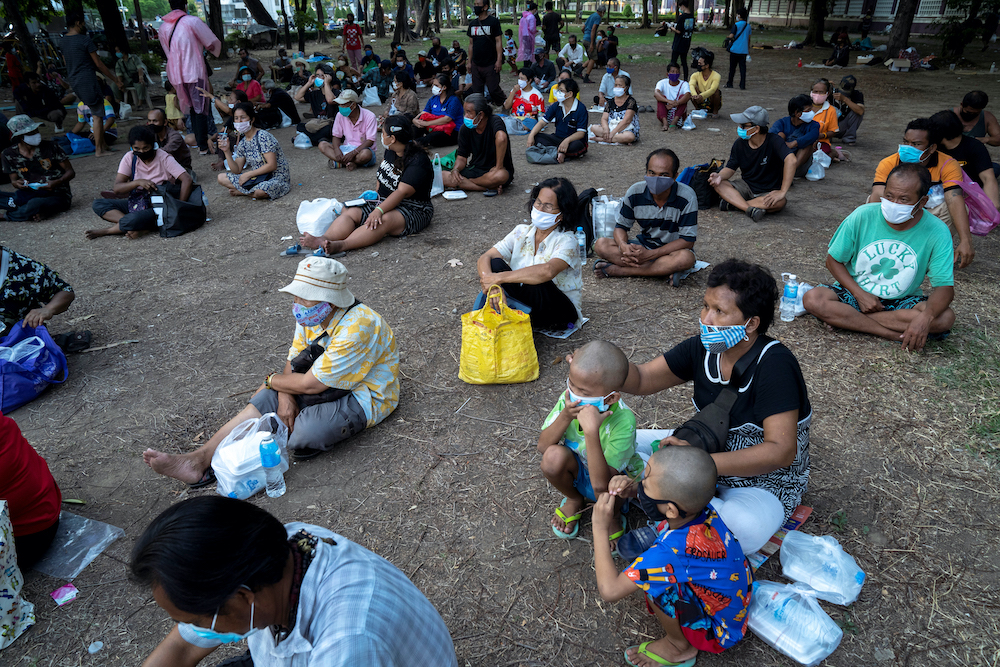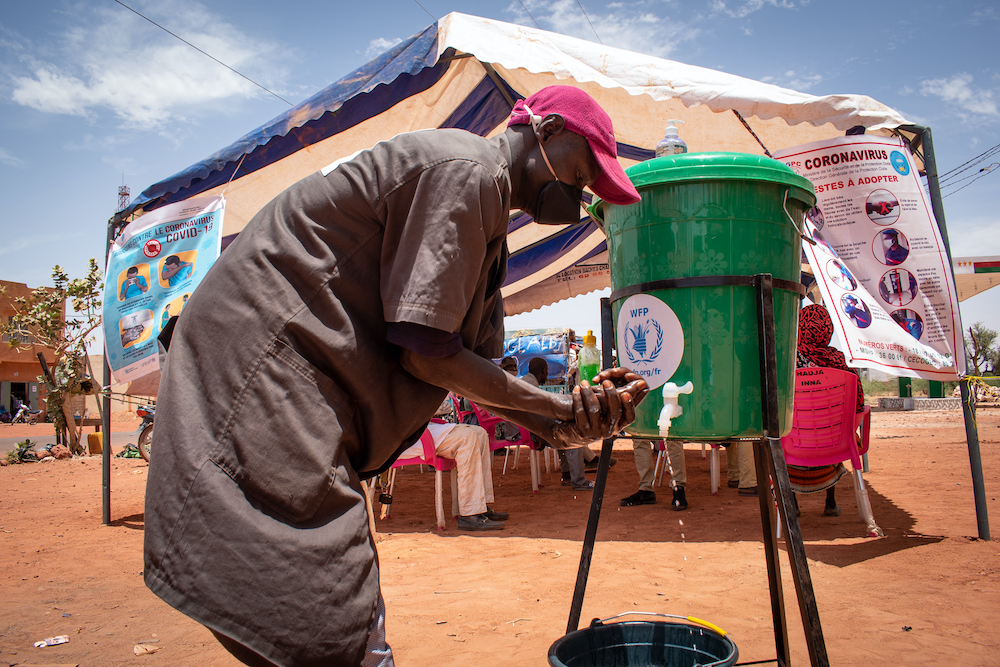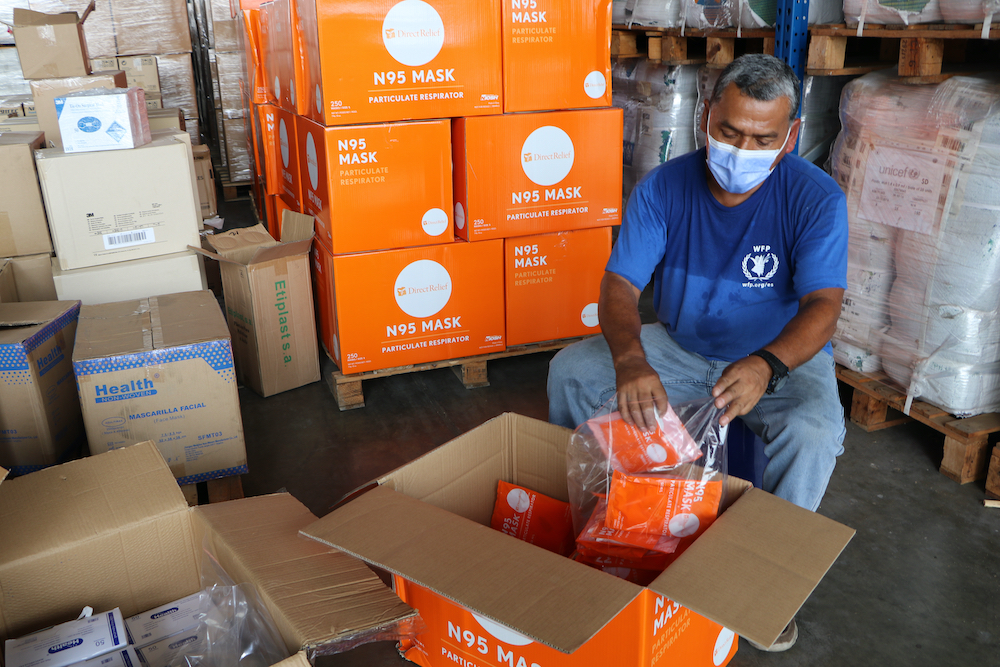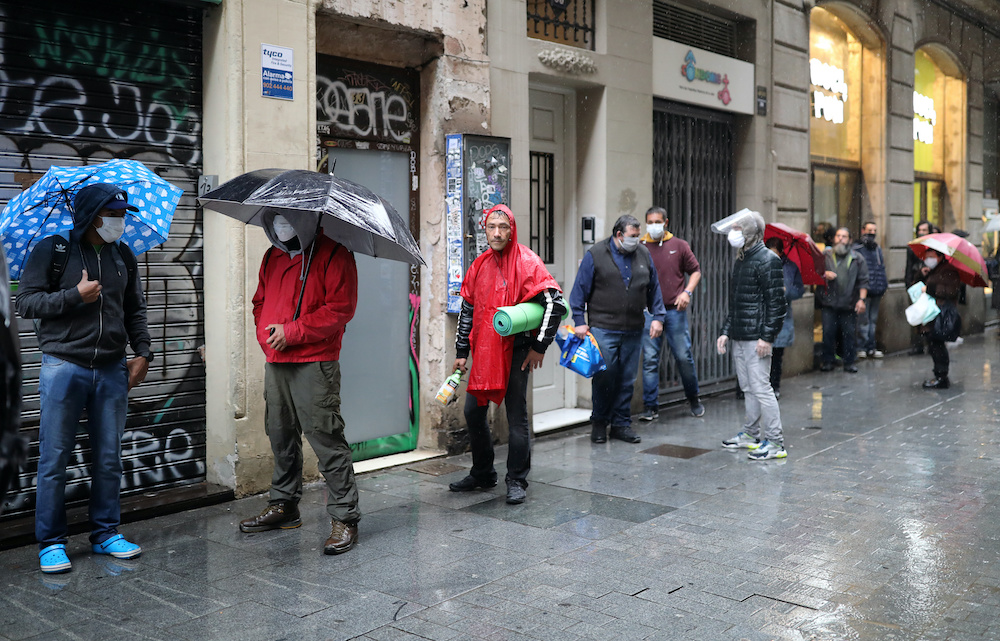Children in Koza, Cameroon, eat a meal made with food provided by the World Food Program on April 30. With schools in Cameroon closed as a preventive measure against COVID-19, the World Food Program is providing take-home rations for students. (World Food Program/Glory Ndaka)
With the COVID-19 pandemic posing the potential to become the worst humanitarian crisis since World War II, millions face the specter of starvation, say United Nations leaders, humanitarian officials and Catholic sisters who were worried the world faced an enormous threat from hunger even before the novel coronavirus.
Such worries are not an abstraction to those responding on the front lines to the worsening global hunger crisis. Yet the work of large charities and the smaller, local efforts by sisters is often all that separates many people from real desperation.
"It's a very, very worrying time," Mercy Sr. Deirdre Mullan, the former director of Mercy Global Concern at the United Nations and now a trustee of the London-based Arise Foundation, told GSR.
She noted in particular the potential for disaster in Africa from a locust plague, which can only further exacerbate the challenges that the COVID-19 epidemic poses for the global food supply chain.
At a recent online meeting with others affiliated with the foundation, which focuses on at-risk children, Mullan said some noted that "we're moving into a very dark period, and that between the combination of climate change and the COVID pandemic, the gap between rich and poor is going to get wider."
Hunger is a part of that gap, she said, and widening hunger has the potential to increase sexual exploitation and trafficking of women and children given the desperation many families are now experiencing.
"Women and girls are at greater risk now," Mullan said, echoing concerns other humanitarian leaders have made in recent weeks.
Mullan, a native of Northern Ireland who lives and works in the United States, said people of goodwill should be concerned about what is happening both globally and locally, noting that hunger is a dynamic everywhere, though desperation is more acute in Africa and other continents where poverty is widespread.
In East Africa, "many poor Kenyans have little financial capacity to cushion themselves from the negative economic impact of the virus," Doreen Ajiambo, GSR's correspondent in Africa, reported.
Linet Achieng, a food merchant who lives in the Kibera slum area of the Kenyan capital of Nairobi, told Ajiambo that life has been unsettled since Kenya confirmed its first case of coronavirus March 12.
Achieng has faced a series of setbacks: Her food kiosk had to close, her family's utilities were cut off over unpaid bills, her husband lost his job, and the family was not able to afford their rent.
"Life is very difficult in the slum. People are not going to work, and some of us have lost businesses," Achieng, a mother of five, told Ajiambo. "We can't afford two consecutive meals a day. The government should work faster to end this pandemic."
That won't be easy, given the mounting and overlapping challenges — most prominently, hunger — governments face right now.
While simultaneously dealing with COVID-19, "we are also on the brink of a hunger pandemic," David Beasley, executive director of the U.N. World Food Program, told the U.N. Security Council on April 21. Beasley's agency warned that the COVID-19 pandemic "could almost double the number of people suffering acute hunger, pushing it to more than a quarter of a billion by the end of 2020."
The day before Beasley's warning, the U.S.-based humanitarian organization Catholic Relief Services said the pandemic is "increasing the risk of a severe food crisis in places where locust swarms, flooding, drought and conflict already are pushing millions of people to the brink."
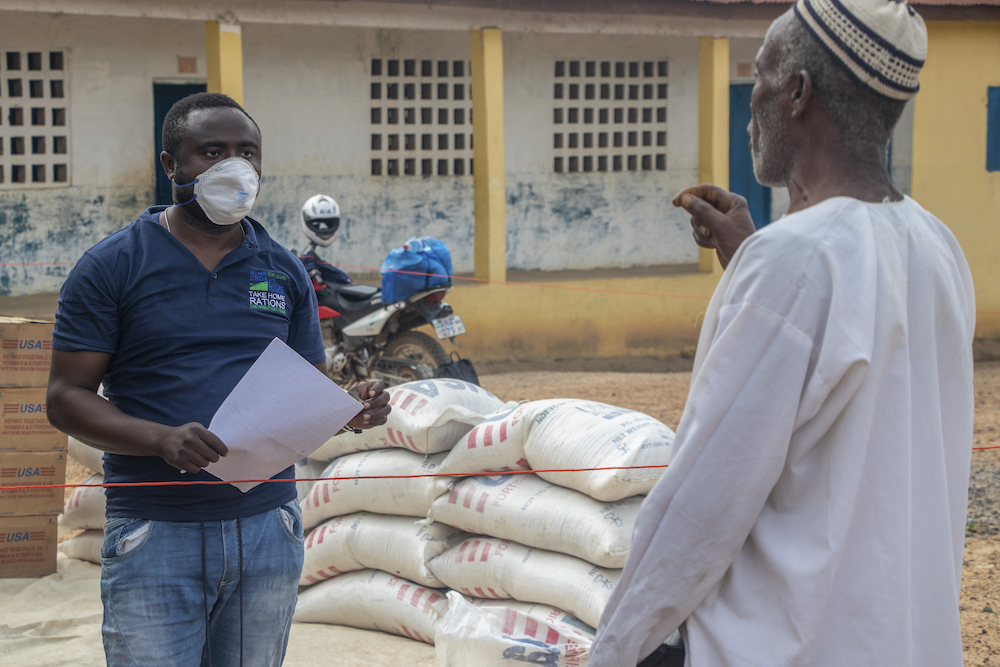
Catholic Relief Services staff and partners distribute take-home food rations to families affected by COVID-19 in Sierra Leone. (Catholic Relief Services/Lauren Bell)
"The pandemic is a crisis on top of a crisis in parts of Africa, Latin America and Asia," Sean Callahan, president and CEO of Catholic Relief Services, said in the April 20 statement.
"The severe health risks are only part of the coronavirus outbreak. Lockdowns are hampering people from planting and harvesting crops, working as day laborers and selling products, among other problems," he said. "That means less income for desperately hungry people to buy food, and less food available at higher prices."
That dynamic is global.
While noting that the specter of starvation has not yet been raised in the United States, Sr. Donna Markham, an Adrian Dominican sister who is the president and CEO of Catholic Charities USA, said hunger in the country is not to be minimized.
"There is serious hunger, especially in poor areas of cities and our countryside," she said: Catholic Charities-supported food pantries have seen a 400% increase of clients in the last two months.
"People are desperate," Markham said in an interview with GSR.
Advertisement
A report issued May 6 by the Brookings Institution's Hamilton Project confirmed those worries. "New nationally representative surveys fielded since the pandemic began show that rates of food insecurity overall, among households with children, and among children themselves are higher than they have ever been on record," wrote Lauren Bauer, a fellow in Economic Studies at the Brookings Institution. She studied data from 2001 to April 2020.
Markham noted that in recent weeks, Catholic Charities clients have expanded to include "hard-pressed" middle-class people who suddenly find themselves unemployed. Long-term, she said, charities can only do so much. "It's not a sustainable situation," she said.
A solution to a broken food supply chain is urgently needed, she said.
"There's something wrong with that equation," she said of a situation in which American milk producers are dumping milk while children go hungry.
"We're trying to puzzle out what to do," Markham said.
While the work of charities is important and "can do a lot to alleviate the immediate problem, it can't be the solution long-term," she said.
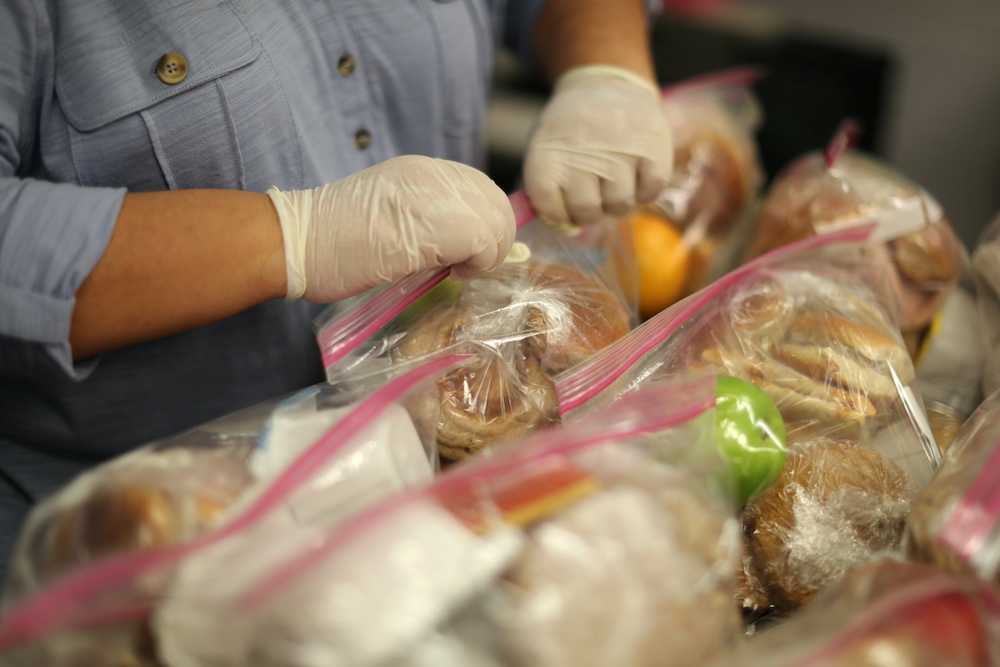
Women in San Fernando, California, prepare meals to hand out to children at the YMCA on April 28 during the coronavirus pandemic. (CNS/Reuters/Lucy Nicholson)
Signs of compassion amid the challenges
But long-term solutions will have to wait. Immediate needs are pressing — evident, for example, in Latin America.
In Brazil, "we've always helped the poorer people in our community with food, but now with this COVID-19, we are seeing double the demand for meals," said Sr. Maria Amada of the Congregation of the Religious Order of the Redemptorist Sisters. The sisters at the Monastery of Santa Face have provided almost 300 meals per day to the unemployed people of Campos dos Goytacazes, in the interior of Rio de Janeiro state.
Because the sisters are cloistered, the meals and food supplies are all delivered through a small window in one of the monastery's gates.
"Two sisters and I deal with the public while the other six, including our mother superior, cook the meals and prepare the care packages," Amada said.
The immediate community has been a huge help to the cloistered contemplative nuns.
"Our friends and families started a social media campaign to garner funds and food for the meals, and the response we received from local merchants and residents has been overwhelming," Amada said.
In recent weeks, the sisters have received so many packages of rice, beans and other food items that "we started to give them away as care packages when we deliver the meals," Amada said. "There are so many families that have nothing in their homes to eat, so every day, when we give them their afternoon lunch, we also add a packet of rice or a liter of milk for the children."
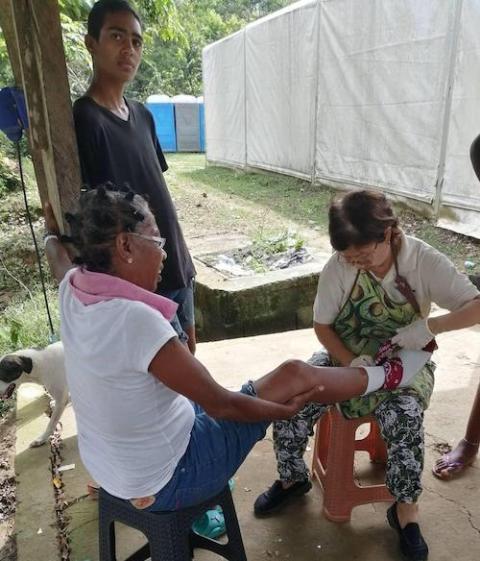
Maryknoll Sr. Jocelyn Fenix wraps the foot of an asylum-seeker at the Las Peñitas detention camp for migrants in Darién, Panama. (Courtesy of Clara Meza)
The religious are compiling a list of those in need in the favela communities near the monastery, and their church partners have started delivering baskets of staples to these families.
"We had one report of children seen eating from the trash dumpsters in a favela community near here and decided to distribute the surplus of food we received," she said.
Also helpful, Amada said, is that a union of bakers has initiated a program in which one of the city's bakeries delivers bread to the monastery for later distribution. Local farmers are also pitching in, delivering fresh vegetables and fruits twice per week. On a recent Monday, she said, the monastery received four garbage bags full of fresh lettuce.
"Despite all the sickness, the response by the community has been wonderful," Amada said.
In Panama, the national government has responded to a high infection rate with a strict nationwide lockdown — this in a country facing challenges before the pandemic.
Panama has made "significant progress in reducing poverty in recent years," according to the World Bank, with poverty falling from 15.4% in 2015 to 12.5% in 2018. However, poverty "only marginally decreased in 2019 and will expectedly increase in 2020 as a result of the COVID-19 outbreak, wiping out the gains in [recent] poverty reductions."
That means hunger for many, posing a challenge to the Sisters of Mercy, who are working in the capital of Panama City, the border state of Chiriquí in the northwest and the port city of Colón, and to the Maryknoll Sisters working in the southeast state of Darién.
Sisters in Panama City and Chiriquí told GSR they had spoken to people who had not eaten in three days. The need is heightened by the presence of an estimated 2,500 migrants nationwide who have made their way through the treacherous Darién Gap on their way to the United States and are now trapped in Panama since borders closed because of the pandemic.
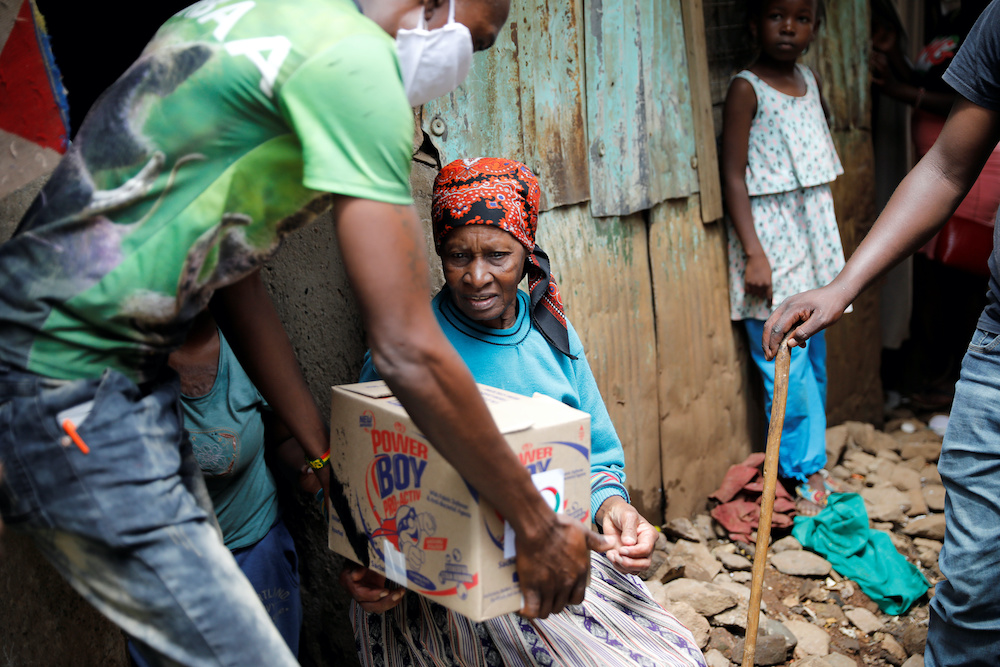
An elderly woman receives a box of food donations given by an aid group to people in need in a poor section of Nairobi, Kenya, on April 14 during the coronavirus pandemic. (CNS/Reuters/Baz Ratner)
In Darién, which borders Colombia, an estimated 1,990 people are housed in two detention centers, one for those with COVID-19 and one for those without. At a pastoral center outside Santa Fe, Maryknoll Srs. Melinda Roper and Jocelyn Fenix and lay missionary Clara Meza cook and deliver an estimated 80 meals per week for their own community and poor elders in Santa Fe while also helping to coordinate efforts to feed the stranded migrants.
They have received assistance from wealthy parishes in Panama City, where they had given a presentation on the migrant situation before the pandemic. They've also received a steady stream of donated crops from local farmers, including the producers in their own sustainable farming network. The government has been providing bonos, or gift cards, for groceries, but migrants are not eligible.
Another overlooked sector is the large indigenous population. Those in the Ngäbe-Buglé comarca (territory), for example, who still practice their traditional agriculture, are providing for themselves and others, but hundreds who work as farm laborers in Costa Rica were deported back to Panama and have no means of support.
In the town of Volcán in the eastern border state of Chiriquí, Mercy Sr. Edia López and her sisters are dividing their time between about 100 indigenous families in the comarca and a growing number of farm families of Volcán. They are supporting the farmers in procuring seeds and other needed items to plant vegetables now that the planting season has begun.
Support has come from the archdiocese as well as from other nonprofit groups, but López and other sisters have also diverted their own budgets to feed the hungry, and they worry about the future.
The gift cards from the government have been too little too late, said Mercy Sr. Angelina Mitre in Panama City, noting that they are often distributed to political supporters rather than the general public.
"I really fear a social explosion," Mitre said. "The situation is very bad."
Managing 'with the minimum' to help fund local projects
In central Vietnam, two congregations based in Hue City are cutting back on food that benefactors donated to the community and giving it instead to those who need it more.
That's not necessarily easy. Sr. Mary Nguyen Thi Tuyet, a member of the advisory committee of the Lovers of the Holy Cross of Hue, said her congregation has lost much of its income since March: three day care centers in Hue City and two buildings for pilgrims at the national Shrine of Our Lady of La Vang in Quang Tri Province have been closed since March 23. In addition, six flower, souvenir and Catholic item shops are closed.
Tuyet said farmers offer the congregation rice, corn, sweet potatoes, watermelon, shrimp and fish. Others have given sisters 1,000 face masks for distribution.
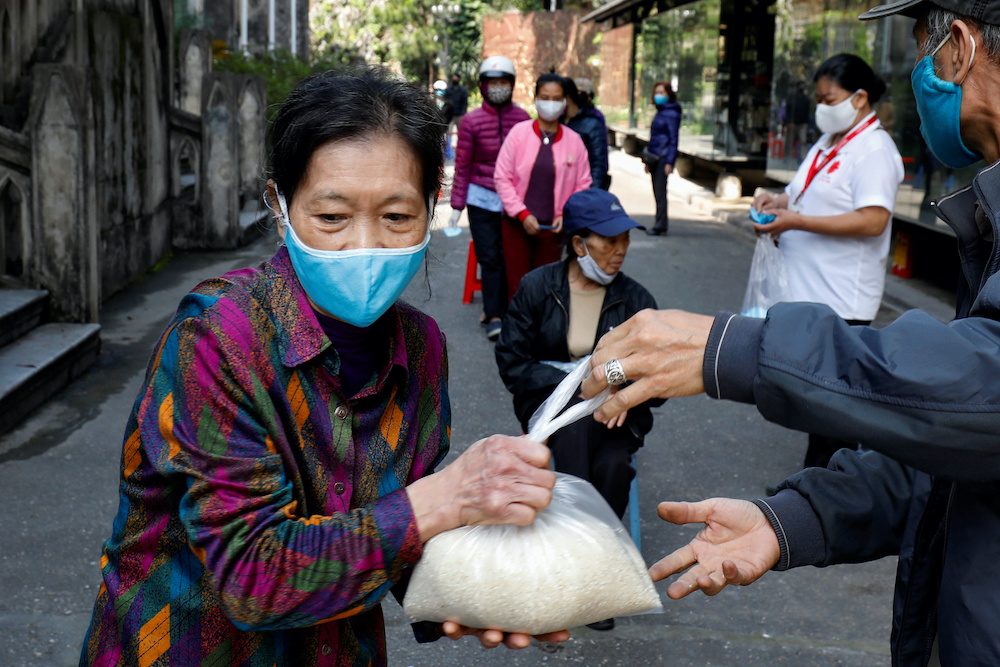
A woman receives a free bag of rice from a volunteer in front of St. Joseph's Cathedral in Hanoi, Vietnam, on April 27, during the COVID-19 pandemic. (CNS/Reuters/Kham)
"Although we live in lack of food, we happily reduced our daily food consumption and shared 500 kilograms [1,100 pounds] of rice with a group of blind people based in Quang Tri Province," Tuyet said. The group of 50 makes bamboo products for a living but is not able to sell products because of the pandemic.
Sr. Agnes Nguyen Thi Khen from the Kim Doi Community of the Daughters of Our Lady of the Visitation, based in Thua Thien Hue Province's Quang Dien District, said some local Catholics have given the community vegetables and food.
Khen, 53, said she also wrote to the U.S.-based nonprofit Medical Aid for Vietnam for relief supplies.
"Thanks to those supplies, we have food to feed orphans," said Khen, who oversees a home for 50 orphaned children.
She said the congregation has also provided 100 families from two districts of Huong Tra and Quang Dien with 10 kilograms (22 pounds) of rice.
"We are deeply grateful to the nuns who ease our starvation in the agony of the coronavirus," said Nguyen Thi Hien, a Buddhist from Huong Phong Commune.
The 48-year-old mother said she and her two sons catch fish in a river daily for a living. Her sons, who used to work at construction sites, recently lost their jobs.
Khen said in the past, sisters from the motherhouse offered food to the orphans, but now, they can no longer afford to do so, since their sources of income dropped dramatically because of the pandemic. They have had to shut down their day care centers and are not able to sell products such as clothes, bottled water, flowers and poultry.
Sisters in India also face hardship and frustration.
"We try to manage with the minimum," said Sr. Arul Mary Susai, the India provincial of the Daughters of St. Paul, who lives in convent of 60 members in Mumbai, India's commercial capital.
Sr. Mary Joseph, superior of the congregation's provincial house in Mumbai, said one contribution the sisters are making is by giving up meat and fish and using the money normally allotted for that food to fund local anti-hunger projects so others may eat.
"We now survive on rice and vegetables, but we have sufficient food," she told GSR. "The only fruit we eat is banana."
Joseph said the sisters in the provincial house are happy to make such sacrifices and are also contributing their pocket money to assist local efforts.
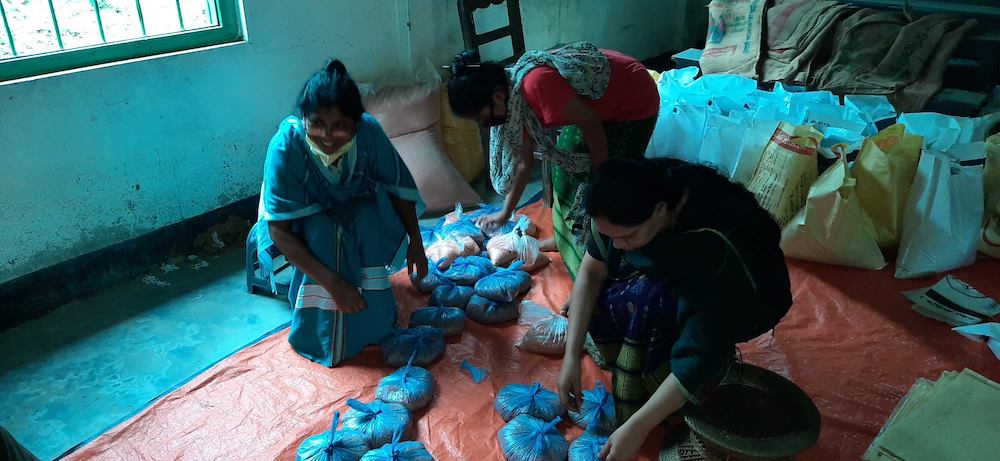
Sisters of the Holy Cross organize food to help needy Catholics on April 22 at Jalchatra Church in Madhupur, Tangail District, Bangladesh. (Provided photo)
Sr. Marie Lou Barboza, a member of the Missionary Sisters of the Immaculate Heart of Mary who works among domestic workers and migrants in Goa, western India, has provided money from a fund established to celebrate international days for women and children. In this case, the sisters spent some 450,000 rupees (about $5,900) to help those who are not working because of the government-imposed lockdown.
The Indian province of the Pious Disciples of the Divine Master is providing funds from Lenten savings and budget cuts for meals.
"We try to limit the expenses on our food consumption. During Lent and the lockdown period, we manage with vegetarian food alone," said provincial Sister Rose Mary, who lives with a community of 40 members in the southern state of Bengaluru. She is also counseling those anxious about the pandemic and lockdown over the telephone.
The anxiety and fear are also evident elsewhere in southern Asia.
Some 6,000 Catholics, members of the indigenous Garo ethnic group and many of whom are day laborers, live in the Jalchatra parish of the Diocese of Mymensingh in north-central Bangladesh.
They are not working because farms are closed because of the pandemic, and they are becoming dependent on potatoes grown in forests where they live, prompting an initiative by members of the Sisters of the Holy Cross.
Local residents have experienced difficult times during the pandemic, Sr. Susuma Costa, a congregational member, told GSR. "They are jobless. So we nuns and priests jointly established a fund for them so that they can survive."
Costa, headmaster of Corpus Christi High School in Jalchatra, Tangail District, said the religious saved money during Lent and have provided 10 kilograms of rice and 2.5 kilograms of lentils to each of 400 families, about 2,000 people total.
"During Lent, we cut expenses from our daily life and deposited money. We used it in a charity fund," Costa said of the five sisters serving the school, a weaving center and parish.
One of those benefiting from the efforts is Sanjoly Chambugong. She told GSR that her family had no food for a while and called the assistance a "blessing for my family members. Now we not need go forest to collect root [forest potatoes]. I thank them."
The assistance was welcome, as government aid has not been enough to stave off hunger, said local lay leader Tushar Rema. He praised the work of the sisters and priests as vital.
"They did great a job," he said. "I admire their kind work."
[Chris Herlinger is GSR international correspondent. His email address is cherlinger@ncronline.org. Contributing to this story are Doreen Ajiambo in Kenya, Lise Alves in Brazil, Tracy Barnett in Mexico, Sumon Corraya in Bangladesh, Lissy Maruthanakuzhy in India and Joachim Pham in Vietnam.]

